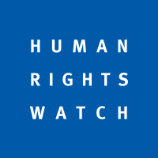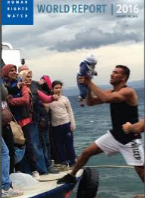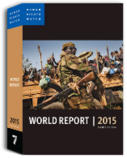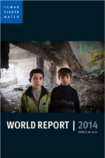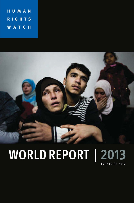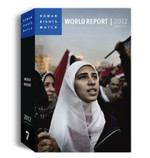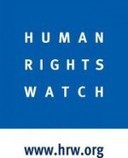Human Rights Watch
Human Rights Watch
Wikipedia
Human Rights Watch (HRW) is an international non-governmental organization that conducts research and advocacy on human rights. HRW headquarters are in New York City with offices in Amsterdam, Beirut, Berlin, Brussels, Chicago, Geneva, Johannesburg, London, Los Angeles, Moscow, Nairobi, Paris, San Francisco, Sydney, Tokyo, Toronto, Washington, D.C., and Zurich.[1]
As of June 2011, the organization’s annual expenses totaled $50.6 million.[2] Read more
Human Rights Watch World Reports -- 2012 - 1016
Human Rights Watch
World Report 2016 (PDF)
World Report 2016 summarizes key human rights issues in more than 90 countries and territories worldwide. It reflects investigative work that Human Rights Watch staff undertook in 2015, usually in close partnership with human rights activists in the country in focus.
In his keynote essay, Human Rights Watch Executive Director Kenneth Roth details how fear drove global developments of 2015. Fears of terror attacks and potential impact of refugee influx led to a scaling back of rights in Europe and other regions. In China, Ethiopia, India, and Russia, fears that social media will energize social and political movements helped to drive a disturbing global trend: the adoption of repressive new laws and policies targeting civil society. Roth traces the ways in which human rights law can and should guide responses to these major global developments. Read more
Human Rights Watch
World Report 2015 (PDF)
World Report 2015 is Human Rights Watch’s 25th annual review of human rights practices around the globe. It summarizes key human rights issues in more than 90 countries and territories worldwide.
In his keynote, Human Rights Watch Executive Director Kenneth Roth reflects on a year so tumultuous, "it can seem as if the world is unraveling." Surveying several of the year’s most daunting security challenges—including the rise of the extremist group Islamic State (also known as ISIS), China’s crackdown on Uighurs in Xinjiang, and Mexico’s abuse-riddled war on drugs—Roth stresses the important role that human rights violations played in fomenting and aggravating those crises.
The report reflects extensive investigative work that Human Rights Watch staff undertook in 2014, usually in close partnership with human rights activists in the country in question. It also reflects the work of our advocacy team, which monitors policy developments and strives to persuade governments and international institutions to curb abuses and promote human rights. Read more
Human Rights Watch
World Report 2014 (PDF)
World Report 2014 is Human Rights Watch’s 24th annual review of human rights practices around the globe. It summarizes key human rights issues in more than 90 countries and territories worldwide, drawing on events through November 2013.
Reflecting on the "Rights Struggles of 2013," Executive Director Kenneth Roth highlights the slaughter of civilians in Syria in the face of a weak international response; "abusive majoritarianism" among governments who voice commitment to democracy but in reality use the real or perceived preferences of the majority to limit dissent and suppress minorities; and new disclosures in the United States about the use of dragnet surveillance and targeted drone killings.
The World Report reflects extensive investigative work that Human Rights Watch staff undertook in 2013, in close partnership with human rights activists on the ground. Read more
Human Rights Watch
World Report 2013 (PDF)
This 23rd annual World Report summarizes human rights conditions in more than 90 countries and territories worldwide in 2012. It reflects extensive investigative work that Human Rights Watch staff has undertaken during the year, often in close partnership with domestic human rights activists.
Two years into the Arab Spring, much of the excitement of the early days of protest has waned and frustration at the slow pace of change has set in. Those now in power face a daunting task: building rights-respecting democracies that uphold the rule of law and protect the rights of all citizens, even those who are unpopular and suppressed. Governments that support human rights have an important role to play in this critical, transitional period by providing critical, principled support to post-authoritarian regimes to ensure that the promise of the Arab Spring is realized. Read more
Human Rights Watch
World Report 2012
This 22nd annual World Report summarizes human rights conditions in more than 90 countries and territories worldwide in 2011. It reflects extensive investigative work
that Human Rights Watch staff has undertaken during the year, often in close partnership with domestic human rights activists.
The introductory essay examines the Arab Spring, which has created an extraordinary opportunity for
change. The global community has a responsibility to help the longsuppressed people of the region seize control of their destiny from often-brutal authoritarian rulers. Standing firmly with people as
they demand their legitimate rights is the best way to stop the bloodshed, while principled insistence on respect for rights is the best way to help these popular movements avoid intolerance,
lawlessness, and summary revenge once in power. Read more
(Cairo, January 22, 2012) -- Many democracies have allowed their ties with repressive allies to temper their support for human rights in the Arab Spring protests,
Human Rights Watch said today in its World Report 2012. For reasons of principle and long-term interest, governments should stand firm with the people of the Middle East and North Africa when they
demand their basic rights and work to ensure the transition to genuine democracies…
…"The people driving the Arab Spring deserve strong international support to realize their rights and to build genuine democracies," said Kenneth Roth, executive director
of Human Rights Watch. "Loyalty to autocratic friends shouldn't stand in the way of siding with democratic reformers. International influence is also needed to ensure that the new governments extend
human rights and the rule of law to all, especially women and minorities." Read more

